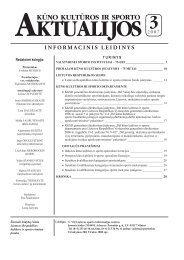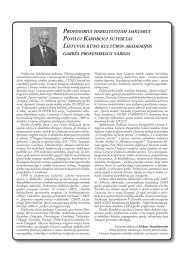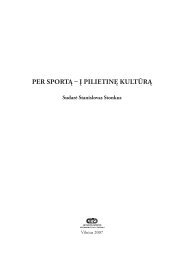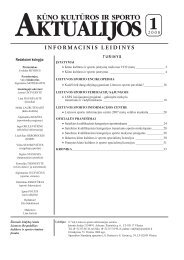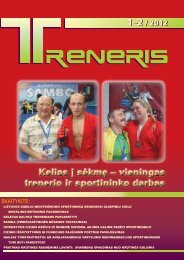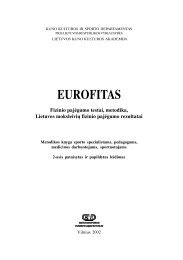Nr. 1 - Lietuvos sporto informacijos centras
Nr. 1 - Lietuvos sporto informacijos centras
Nr. 1 - Lietuvos sporto informacijos centras
Create successful ePaper yourself
Turn your PDF publications into a flip-book with our unique Google optimized e-Paper software.
32<br />
SPORTO MOKSLAS<br />
that such actions were quite common), trying to<br />
block the opponents moves (33,3% of the coaches<br />
thought that those actions were often), making an<br />
attempt to discuss with the referee after violating<br />
the rules (26,9% indicated that those actions were<br />
often), etc. In the coaches’ opinion the provocations<br />
against the opponents for ones own benefit trying to<br />
make the rivals lose their balance and force them to<br />
make illegal movements were also common (29,0%<br />
and 17,2% respectively). Analogically role-playing<br />
is also not avoided in the sports contest. 14,0% of<br />
the coaches claimed that very often athletes pretend<br />
they are injured, and 26,9% think that athletes simply<br />
imitate the fouls of the rivals. The data of the inquiry<br />
indicated that the forms of deception in sport which<br />
were not so often were athletes’ manipulation with the<br />
final results of the contest, and the trials of referees<br />
and sports organizers to make impact on the contest<br />
results. The first form of deception manifests in<br />
athletes attempts to lose the match aiming to have<br />
more favourable opponents in the next stage (30,0%<br />
of coaches said that it happened sometimes) and<br />
when athletes gamble on the final results of the match<br />
(18,3% agreed that it happened sometimes). The<br />
second form of deception manifests when referees<br />
deliberately make wrong decisions (41,9% of the<br />
coaches thought that referees sometimes did that)<br />
and when the team leaders make agreements on the<br />
final outcomes of the contest (36,6% agreed that it<br />
happened sometimes).<br />
Table 2<br />
Deception in sports activities scale correlation with<br />
MSOS‐25 subscales<br />
Factors 1 2 3 4 5<br />
1. Respect for social conventions<br />
2. Respect for the rules and the 0,57**<br />
officials<br />
3. Respect for one’s commitment 0,57** 0,46**<br />
towards sport participation<br />
4. Respect and concern for the 0,28** 0,50** 0,12<br />
opponent<br />
5. Negative approach towards ‐0,09 ‐0,20 ‐0,01 0,09<br />
the practice of sport<br />
6. Justification of deception ‐0,27* ‐0,13 ‐0,23* ‐0,18 0,22*<br />
Note. Correlations were significant at *– p




